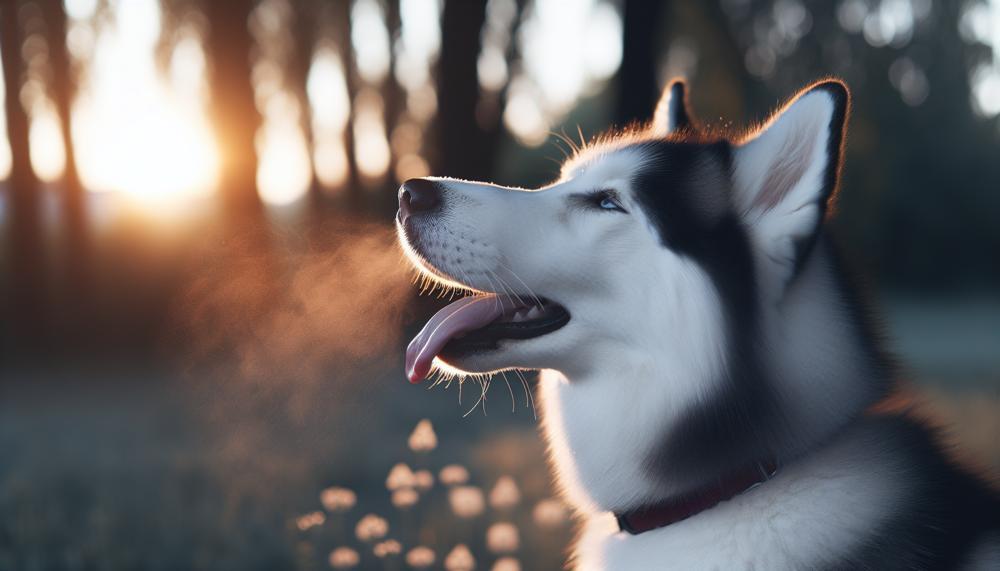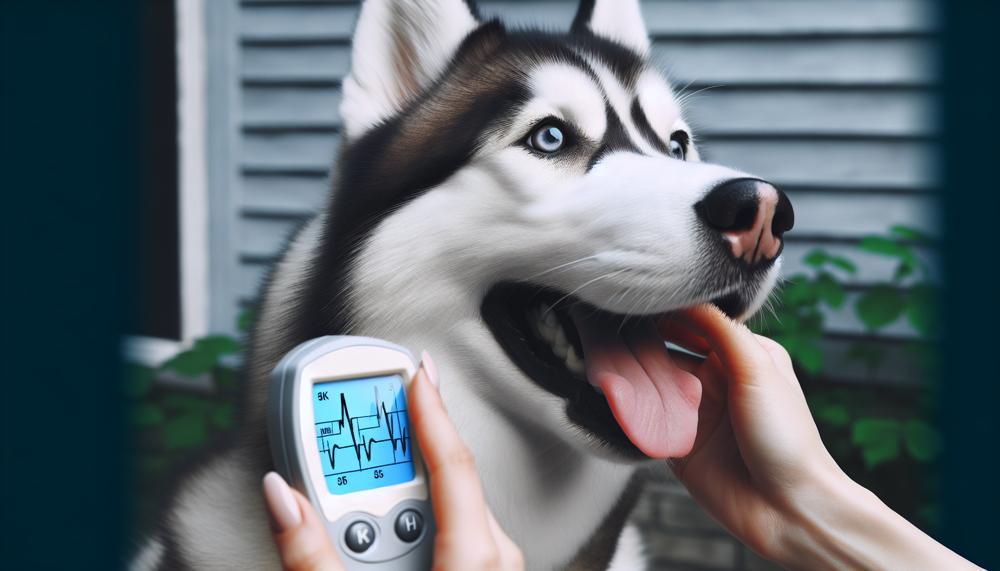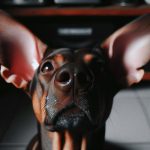Are you a husky enthusiast or curious about this majestic breed? If so, you may have noticed that huskies have a unique habit of breathing fast. But what’s the reason behind it?
In this blog post, we’ll delve into the world of husky breathing and uncover the mysteries behind their rapid respiration.
Get ready to discover:
- The distinct physiology of huskies that sets them apart from other dog breeds
- How their ancestors’ survival instincts influence their breathing patterns
- The impact of exercise and temperature on a husky’s breathing rate
- Common misconceptions about fast-breathing huskies and the truth behind them
- Tips for monitoring and managing your husky’s breathing for optimal health and happiness
So, if you’ve ever wondered why your furry companion breathes faster than other dogs, keep reading to unravel the secrets behind this fascinating behavior.
Why is my Husky Breathing so Fast
Table of Contents
- 1 Why is my Husky Breathing so Fast
- 2 Signs of Rapid Breathing in Dogs
- 3 Possible Reasons for Fast Breathing in Dogs
- 4 Top 10 Reasons why your husky Breathes Rapidly
- 5 Diagnosing the Cause of Rapid Breathing in Dogs
- 6 Managing Rapid Breathing in Huskies: Tips and Techniques to Help Reduce Fast Breathing
- 7 Understanding the cost of husky treatment
- 8 Conclusion
Huskies are known for their lively and active nature, which can lead to fast breathing due to their high metabolism and energetic lifestyle.
However, it is essential to determine if this rapid breathing is a cause for concern, as it may also be a sign of underlying health issues.
Here are some common reasons why Huskies may have fast breathing, along with tips on how to identify if it is a cause for concern:
- Metabolism and Activity Level: Due to their high metabolism and energetic nature, Huskies may breathe faster than other breeds, especially after physical activity. This is considered normal and not a cause for concern.
- Overheating: Huskies have thick fur coats that help them withstand cold temperatures, but this also means they are susceptible to overheating in warmer weather. If your Husky seems to be panting excessively and has rapid breathing accompanied by other symptoms such as drooling and lethargy, it is crucial to seek immediate veterinary attention.
- Health Issues: Rapid breathing can also be a symptom of underlying health problems such as heart issues, respiratory conditions, Cushing’s syndrome, poisoning, or medication side effects. If your Husky is breathing fast without any apparent reason or displays other symptoms like excessive panting, shallow breaths, or flaring nostrils, consult a veterinarian.
- Breathing Rate: It is essential to monitor your dog’s respiratory rate while they are resting or sleeping. The normal breathing rate for dogs is 18 to 34 breaths per minute. If your Husky’s breathing rate falls outside of this range or appears labored or irregular, it could be a sign of trouble.
- Changes in Breathing Pattern: Alterations in a dog’s regular breathing pattern can also indicate pain or anxiety. If you notice your Husky breathing faster than usual while resting or at bedtime, it is important to consult a veterinarian to determine the cause.
Signs of Rapid Breathing in Dogs
Huskies who exhibit signs of rapid breathing, such as taking more than 120 breaths per minute at rest, heavy panting, and a fast rise and fall of their belly, may be experiencing various underlying issues.
These could range from mild causes like heat exhaustion or stress and anxiety, to more severe health concerns like heart or respiratory problems.
It’s crucial to identify and address these symptoms early on, as proper treatment can significantly enhance your husky’s overall health and overall well-being.
One husky owner, Tom, noticed his dog, Shadow, exhibiting these signs while out for their daily run.
Despite the cool weather, Shadow was panting heavily and had a noticeable rise and fall in her belly. Concerned, Tom took her to the vet where they discovered she had a respiratory infection.
Thanks to Tom’s quick detection and treatment, Shadow made a full recovery and is back to her energetic self.
Possible Reasons for Fast Breathing in Dogs
Dogs, specifically huskies, can experience rapid breathing as a result of various medical conditions or triggers.
These causes should not be taken lightly and require close monitoring to ensure the health and well-being of your dog.
Below is a table outlining some possible causes of fast breathing in dogs, along with their symptoms and recommended treatment.
| Possible Causes | Signs and Symptoms | Treatment Options |
| Respiratory issues such as lung diseases or infections | Difficulty breathing, shallow breaths, excessive panting | Antibiotics, bronchodilators, and oxygen therapy |
| Heatstroke | Rapid breathing, excessive panting, weakness, collapse | Cooling measures, IV fluids, and oxygen therapy |
| Underlying health conditions (e.g. heart failure, anemia, onion poisoning) | Rapid breathing, pale gums, lethargy, weakness | Medication specific to the underlying condition |
| Anxiety or pain | Rapid breathing, restlessness, pacing | Behavioral modification techniques and pain relief medication if necessary |
It is important to note that fast breathing in dogs should never be ignored and should always be closely monitored. If your dog is exhibiting rapid breathing while resting or sleeping, seek immediate veterinary care.
A veterinarian will perform a physical examination and run tests to determine the underlying cause of the fast breathing and provide appropriate treatment.
Top 10 Reasons why your husky Breathes Rapidly
| Top 10 Reasons Why Your Husky Breathes Rapidly | What You Can Do About It |
|---|---|
| Temperature Can Affect Their Breathing | Keep Them Cool During Hot Weather With Air Conditioning or Cooling Mats |
| Obesity Can Lead to Rapid Breathing | Monitor Their Weight and Adjust Their Diet if Necessary to Prevent Obesity |
| Heart Problems Can Cause Rapid Breathing | Regular Check-Ups With a Vet Can Help Detect Any Underlying Health Issues Early On |
| Cushing’s Syndrome Is a Serious Health Concern That Can Cause Rapid Breathing | Seek Immediate Medical Attention if Symptoms Persist or Worsen |
| Respiratory Problems Can Cause Rapid Breathing | Avoid Feeding Them Onions or Garlic, Which Can Be Poisonous to Huskies |
| Onion Poisoning Can Be Dangerous for Huskies and Cause Rapid Breathing | Avoid Feeding Them Onions or Garlic to Prevent Poisoning |
| Rapid Breathing After Exercise or Excitement is Normal for Huskies | Allow Them to Rest and Regulate Their Breathing After Exercise or Excitement |
| Sleep Cycles Can Affect Huskies’ Breathing Patterns | Be Aware of Their Sleep Patterns and Understand That Rapid Breathing During Sleep is Normal for Huskies |
| Huskies with a Diaphragmatic Hernia May Experience Rapid Breathing and Require Immediate Treatment | Consult a Vet if You Suspect Your Husky Has a Diaphragmatic Hernia |
| Puppies and Growth Can Lead to Rapid Breathing | Be Patient With Puppies as They Grow and Develop, and Seek Medical Attention if Symptoms Persist or Worsen |
Diagnosing the Cause of Rapid Breathing in Dogs
Your husky’s fast breathing can be a cause for concern, especially if it is accompanied by other symptoms like excessive panting and flared nostrils. To diagnose the underlying cause, it is crucial to carefully observe your dog’s behavior and seek immediate medical attention if they struggle to breathe while at rest.
A vet will conduct a physical exam and request a complete medical history to identify the root cause, which could range from lung or heart disease to heatstroke. Treatment will vary depending on the specific condition but may involve hospitalization and close monitoring until their breathing improves.
It is vital to provide your furry friend with water and shade during hot weather to prevent heatstroke. Regular check-ups are also important to catch any potential health issues early on.
Always remember, if you notice any changes in your husky’s breathing, it is best to consult with a veterinarian for proper diagnosis and treatment.
Managing Rapid Breathing in Huskies: Tips and Techniques to Help Reduce Fast Breathing
There are some helpful tips and techniques to manage rapid breathing in huskies which you can follow:
- Keep an eye on your husky’s breathing rate while they are resting and watch out for any unusual patterns or symptoms. A normal respiratory rate for dogs is between 18 to 34 breaths per minute.
- First, identify the root cause of your husky’s fast breathing. Possible reasons include overheating, overexertion, obesity, laryngeal paralysis, poisoning, or side effects from medication.
- To prevent your husky from overheating, make sure they have access to water at all times and stay hydrated. You can also use a cooling mat or vest and let them play or swim in water to cool down.
- It is crucial to keep your husky at a healthy weight through moderate exercise to avoid overexertion and obesity. Consult with a veterinarian for a proper diet plan and ensure your husky gets regular exercise.
- Monitor the temperature and humidity levels in your home as well as your husky’s activity level to prevent overheating.
- Certain substances such as garlic and onion can be toxic for huskies, so keep them away to prevent poisoning and rapid panting.
- If your older husky shows signs of laryngeal paralysis, such as loud breathing noises, consult with a vet immediately.
- Always consult with a veterinarian before giving any medication to your husky to ensure it does not have any side effects that may cause rapid breathing.
- Seek immediate medical attention if your husky displays signs of heatstroke, which can be life-threatening.
Understanding the cost of husky treatment

Treating a husky’s breathing problems can vary in cost from relatively cheap to more expensive, depending on the severity of the issue. On average, a visit to the vet for a breathing issue can cost between $50-$150, not including any necessary tests or medications.
Additional costs may include follow-up visits and ongoing medication or treatment plans. In some cases, surgery may be required, which can cost anywhere from $500 to several thousand dollars.
It is crucial to consult with a trusted veterinarian and discuss potential costs before deciding on a treatment plan for your husky’s breathing issues.
| Expense | Cost Range | Details |
| Vet Visits | $50-$150 | This includes an initial consultation and examination. |
| Tests/ Medications | Varies | Additional costs may vary depending on the specific issue and recommended treatment plan. |
| Follow-up Visits | Varies | There may be ongoing costs for monitoring and continued treatment. |
| Surgery | $500-$5000+ | In extreme cases, surgery may be necessary for certain breathing issues, such as collapsed trachea or laryngeal paralysis. |
Also Read: Why Do Dogs Hump The Air?
Conclusion
In conclusion, the rapid breathing of huskies is a fascinating behavior that can be explained by their unique physiology and ancestral instincts.
While it may seem alarming at first, it is a normal occurrence for these energetic and active dogs. However, it is important for pet owners to keep an eye on their husky’s breathing patterns and seek professional advice if necessary.
Misconceptions about fast-breathing huskies should not be disregarded, as it could also indicate underlying health issues. By understanding the potential causes and being vigilant of any changes in our furry companions’ breathing, we can ensure their well-being and happiness.
Regular check-ups with a trusted veterinarian are crucial in identifying any potential problems early on and providing appropriate care. With proper attention and care, our beloved huskies can continue to thrive and live a long, healthy life.






